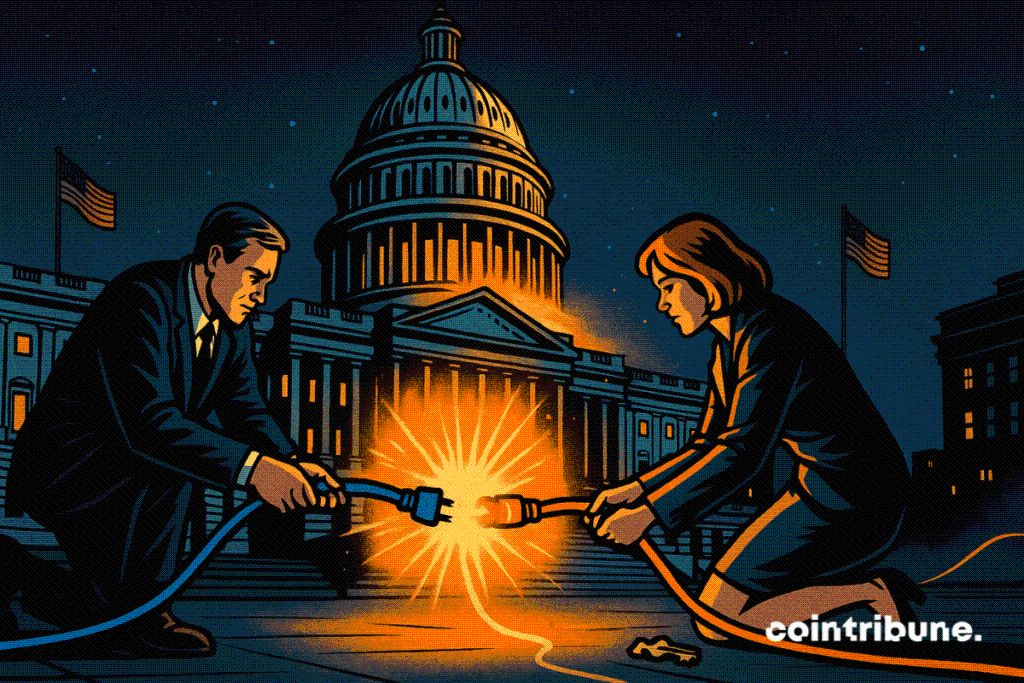Federal Services To Restart After Senate Breakthrough
After more than 40 days of paralysis, Washington is beginning to emerge from the crisis. On Monday evening, the Senate voted on a temporary funding law aimed at reopening federal agencies, including the SEC, essential to the crypto ecosystem. If the House approves the text this Wednesday, the government could resume its activities by the end of the week. This outcome is closely watched by the markets, as several key cases for the blockchain industry are awaiting revival.

In Brief
- The US Senate adopts a budget law aimed at ending more than 40 days of federal shutdown.
- This text, awaiting validation by the House of Representatives, would fund the state until January 31, 2026.
- The reopening of the SEC is expected as soon as the law comes into force, reviving strategic crypto cases.
- Several important decisions, including those on spot Bitcoin ETFs, were delayed by administrative paralysis.
A decisive vote in the Senate to end the governmental stalemate
On Monday evening, the US Senate voted on a temporary budget law aimed at reopening all federal services paralyzed for more than 40 days because of the shutdown .
This text, titled “continuing appropriations and extensions for fiscal year 2026”, was adopted by 60 votes to 40 , thanks to the rally of several Democratic senators to the Republicans. It would fund institutions until January 31, 2026, subject to its adoption in the House of Representatives, where the vote is expected as early as this Wednesday.
The US Senate held a late-night vote on the bill […] which was adopted by 60 votes to 40 in the chamber. The text must then be signed into law by President Donald Trump.
This gradual unblocking should lead to the reopening of federal agencies, including the Securities and Exchange Commission (SEC), which until now operated with very reduced staff. Indeed, the SEC’s emergency plan provides that its employees can return on the business day following the enactment of the funding law. Full resumption of activities could thus occur by the end of the week. Here are notable points :
- The shutdown, of a record duration of more than 40 days, caused an almost total freeze of administrative operations, including those related to the review of crypto cases ;
- Key regulatory decisions, notably regarding spot Bitcoin ETFs, were put on hold ;
- Polymarket, a decentralized forecasting platform, estimates that the return to normal operations could happen on Friday, if the legislative schedule is respected.
A legislative window for the crypto bill under discussion
Beyond the simple resumption of administrative activities, this return to normalcy could revive another key issue for the crypto industry : the regulation of digital markets. Alongside the budget vote, the leaders of the Senate Agriculture Committee unveiled a crypto market structure bill on Monday.
This text, awaited for several months, follows a version already passed by the House of Representatives about four months ago. It is an ambitious legislative project, notably aiming to clarify the respective roles of the SEC and the CFTC, and to establish a coherent legal framework for platforms, DeFi, stablecoins, and crypto derivatives.
The shutdown having slowed down these discussions, its resolution could accelerate the parliamentary schedule. However, the political clock is ticking. North Carolina Republican Senator Thom Tillis warned against postponing the adoption of the text beyond January or February. “Pushing the vote beyond January or February could make the text vulnerable”, he warned. This results in strong pressure on legislators to move forward quickly.
This law could mark a turning point in crypto regulation in the United States. If adopted, it would provide sector actors with better legal visibility and could encourage institutional investments. Conversely, a new political deadlock or a delay linked to the electoral agenda could extend the current regulatory uncertainty, in a context where the United States already face competition from other more advanced jurisdictions, such as the European Union with MiCA.
Disclaimer: The content of this article solely reflects the author's opinion and does not represent the platform in any capacity. This article is not intended to serve as a reference for making investment decisions.
You may also like
Cardano News Today: Balancing Privacy and Regulation: Three Cryptocurrency Initiatives Transforming the Industry
- Privacy-focused blockchains gain traction as Zcash (ZEC) surges 1,172% YTD, leveraging zk-SNARKs for 20-25% shielded transactions. - Midnight (MIDNIGHT), a Cardano-based privacy sidechain, combines GDPR compliance with hybrid consensus, attracting institutional interest since 2023. - Cardano (ADA) expands DeFi ecosystem with $500M+ TVL, aligning privacy-first vision with 2025 regulatory clarity to boost institutional adoption. - Privacy coins like Zcash and Midnight reflect growing demand for confidentia

Bitcoin Updates: Surge in Stablecoin Deposits Signals a Bullish Shift for Bitcoin
- Binance's 102.11% Bitcoin reserve ratio and $41B stablecoin inflows in Q3 2025 signal strong liquidity amid bullish market conditions. - Historical patterns show Bitcoin's current liquidity setup mirrors pre-2020 rally conditions, with SSR at 13 indicating potential price rebounds. - Analysts project $110,000-$115,000 targets for Q1 2026, but caution structural support at current levels could precede deeper corrections.

Operational challenges and disagreements among investors have cast uncertainty over Cloud IP's projections for 2028
- International Paper (IP) reports $1.1B Q3 loss despite $6.22B sales, with 2025 net sales projected at $24B amid mill reliability challenges. - Extended Sylvamo supply agreement through 2026 highlights asset optimization but raises execution risks as Riverdale Mill conversion threatens supply chain stability. - Institutional investors show mixed stances: Resona increased 9.5% stake while BMO cut holdings by 26.5%, reflecting uncertainty over -381.30 P/E ratio and 4.9% dividend yield. - Analysts remain spl

Ethereum Updates Today: Aero Connects Blockchains as DeFi Moves Entirely On-Chain
- Aerodrome and Velodrome merge to form Aero, a cross-chain DeFi hub launching Q2 2026, unifying Ethereum Layer 2 liquidity and expanding to mainnet and Circle's Arc blockchain. - AERO token allocation reflects Aerodrome's 94.5% TVL dominance ($479M vs. Velodrome's $55M), balancing stakeholder incentives while avoiding over-dilution per DeFi governance experts. - Aero introduces arbitrage revenue capture, zero-knowledge integrations, and a unified cross-chain interface, aiming to capture 10-15% of Layer 2

